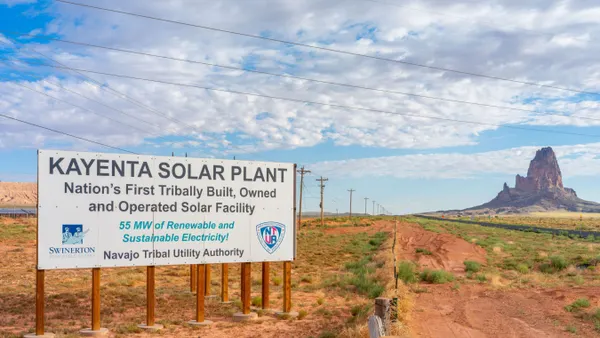The following is a contributed article by Lisa Markus, Managing Director for E Source’s Consulting & Advisory Services.
As the nation mobilizes to contain the coronavirus, utilities’ most vulnerable customers need special assistance as the pandemic exposes and exacerbates existing fault lines between haves and have-nots. Utilities that shift from a "business as usual” to “corporate social responsibility" approach can not only strengthen their communities, but also will help stabilize the economy as all sectors struggle to regain health.
COVID-19 impact on low-income customers
Troubled utility customers are the least likely to be able to “socially distance” themselves from contact with the virus, and the most likely to have utility arrearages. Additionally, while the Centers for Disease Control and Prevention advises deep cleaning of facilities to cut down contagions, it’s the front-line employees tasked with doing that important work. Service industry jobs — which comprise the bulk of working class employment — put this financially vulnerable workforce in the cross-hairs of social contact and infected individuals.
While utilities and other employers are instructing their staff to work from home, front-line employees, such as food service or retail workers, are unable to telework. Additionally, energy insecurity individuals — those having to make trade offs between buying food, seeking medical care, fulfilling prescription drugs or paying their utility bills — do not have the home set up of dependable internet connection, light, heat and water to facilitate remote working, even if their employers offered it.
And if vulnerable utility customers face energy insecurity, they almost always face food insecurity as well. Through the research of Columbia University’s Diana Hernandez, we know that there is a direct overlap between food and energy insecurity, and that if you knock out one, the individual is more likely to be able to resolve the other. More than 30% of the nation’s population faces the food/energy insecurity dilemma according to the Working Poor Project. Thankfully DC District Court granted an injunction against the April 1 U.S. Department of Agriculture’s rule change to the Supplemental Nutrition Assistance Program, which would have left an additional 700,000 without food stamp benefits.
Utilities need to become advocates for their troubled customers
Utilities are stepping up to help their most vulnerable customers in their time of need. Given most utilities’ identification and continued work in public service, it puts them at the hub of being able to integrate resources across the spectrum on behalf of troubled customers. Here is a framework to consider:
- Maintaining reliable, affordable and safe service. Consumer confidence can be boosted by utilities' continued reliable service during this stressful time. Reassurance is especially important as most people may have taken utility services for granted.
- Instate a moratorium on shut-offs. Following the lead of California, Connecticut, Illinois, New York and New Jersey, other states and utilities within those states are instating moratoriums on shutting off power and water for those not able to pay. With the state of Michigan paying the $25 reconnection fee, Detroit Water and Sewer is reinstating water service (in addition to not shutting people off) in light of the coronavirus and CDC recommendation of handwashing to stop the virus spread.
- Institute bill relief. Current utility low-income programs and payment programs provide help after customers are in a hole that they can’t climb out of, and don’t focus on helping the customer achieve financial independence. Utilities need to focus on providing meaningful bill relief and not penalize impacted customers who can’t pay their utility bills. Energy Outreach Colorado Executive Director Jennifer Gremmert said they are working with utilities in Colorado around their consumer protection policies and the nonprofit is releasing assistance funds earlier than scheduled. Additionally, instituting flexible payment programs — allowing customers to pay when they can — waiving penalty fees and waiving processing fees for credit cards will help alleviate increasing burdens according to Gremmert. Additionally, utilities can partner with credit-building nonprofits that provide an alternative to payday loans to help consumers build their credit worthiness while repaying debt.
- Partnering to provide food relief. Utilities can broaden their reach to join forces with regional food banks to bring nourishment to vulnerable customers. Because of the current trade situation, there is an abundance of food that is not able to be exported, which presents an opportunity for local companies to be part of the solution and to do so at a reduced rate, according to Hilda Ayala, programs director, LA Regional Food Bank. The first step is to contact Feed America or your local regional food bank. Operations such as the LA Regional Food Bank have mobile food pantries and food pharmacies that can be mobilized to visit vulnerable areas in utility service territories.
- Pay special attention to your employees. Often utilities focus their outreach on the external community and may unintentionally overlook those in need within their own ranks. Utility employees, who are the staunchest advocates for those in need, are those who have experienced it themselves — either as children or adults. Make sure there is focused outreach to employees so that they can provide for their families and support their communities.
Amidst crisis, utilities have a chance to shine as a source of stability and a unifying force in getting vulnerable customers back on their feet. Utilities that think creatively, and respond above and beyond to the need by working across internal and external silos can take foundational steps toward helping troubled customers weather the pandemic, as well as make inroads to financial stability.













